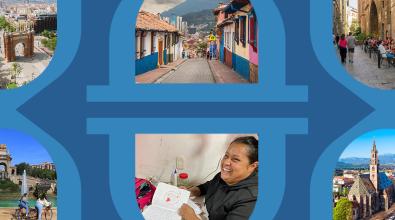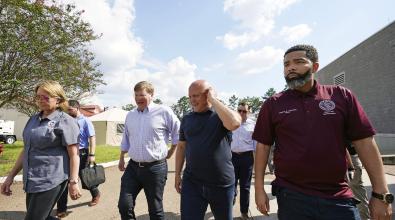Mayors see workforce opportunities in infrastructure funds

Mayors from across the U.S. joined a session of the Local Infrastructure Hub Tuesday to mark the one-year anniversary of the $1.2 trillion Bipartisan Infrastructure Law and to learn about funding opportunities in the law to strengthen and prepare their workforces for the future.
“After talking about infrastructure for two decades, Congress finally acted—and now it's up to mayors and other local leaders to put federal funding to good use,” said Michael R. Bloomberg, founder of Bloomberg LP and Bloomberg Philanthropies, and 108th Mayor of New York City. “The challenge you have is not only putting shovels in the ground. It's training and preparing people for jobs in emerging and growing industries, not the jobs of the past.”
The infrastructure law includes more than $800 million specifically for workforce development. It also made changes to allow many transportation projects to use a portion of additional funds for workforce training programs, including apprenticeships, pre-apprenticeships, and on-the-job training.
U.S. Secretary of Commerce Gina Raimondo said workforce training will be key to enhancing America’s economic competitiveness. “It's important that we train all Americans,” she said. “That means making sure women have a shot to be trained to become apprentices as plumbers and pipe fitters and electricians—all good paying jobs. It means kids of color can be exposed to computer-science training and technical training so they can get new jobs in semiconductor facilities.”
“It's just absolutely critical,” Raimondo continued, “that we work with mayors, with the federal government, and with businesses to make sure that every American has a shot at getting the skills they need to get a good job.”
Maria Flynn, CEO and President of Jobs for the Future underlined that point, noting that it’s not just the Infrastructure Law creating opportunities for cities right now but also the CHIPS and Science Act, the Inflation Reduction Act, the Build Back Better Regional Challenge, and other federal initiatives.
“These historic investments in creating millions of good new jobs offer a critically important opportunity to engage underserved communities,” Flynn said. “Local leaders can work to ensure jobseekers and workers, especially those who have been historically marginalized—including women, people of color, and immigrants—receive the kind of skills training needed for family supporting careers.”
Mayor Kim Norton of Rochester, Minn., shared with mayors her city’s approach to opening construction jobs to women of color—a program that won $1 million in the Bloomberg Philanthropies Global Mayors Challenge. Women of color make up 13 percent of Rochester’s population, yet fill less than 1 percent of the jobs in Rochester’s booming construction industry.
“We involved women from step one in designing everything we do,” Norton said. “So they're at the table with our developers, with our construction owners, and union employees who came to the table. It was really quiet at first, but as time went on, trust continued to grow, relationships developed, and ideas came out of that year-long work.”
For example, Norton said, businesses agreed to conduct diversity, equity, and inclusion assessments. Women have also asked for navigators to be available on job sites to help when they encounter problems, and for flexibility when it comes to scheduling and childcare.
Lansing, Mich., Mayor Andy Schor, whose city is a hub of electric vehicle manufacturing, said a combination of approaches is needed to build local talent. Schor said that means working with community colleges, the school district, and local unions, and boosting downtown amenities to make Lansing a fun place for young people to want to be.
Schor also stressed that jobs that require training rather than four-year degrees are plentiful. “Our kids here in Lansing are seeing they can come right out of high school or go to community college for two years and learn the trade,” he said. “They can go right into these assembly plants and make money, provide for their families without debt.”
Tuesday's learning session was the latest support for U.S. cities offered through the Local Infrastructure Hub. Bloomberg Philanthropies, The Ballmer Group, Emerson Collective, Ford Foundation, and the Kresge Foundation joined together and contributed $55 million to the Local Infrastructure Hub to help local leaders make the most of the historic opportunities in the Bipartisan Infrastructure Law. Technical assistance and learning support through the Local Infrastructure Hub is delivered by the U.S. Conference of Mayors, National League of Cities, and Results for America.
Additional resources for local leaders:
Using federal funds to create local infrastructure jobs (National League of Cities resource)


